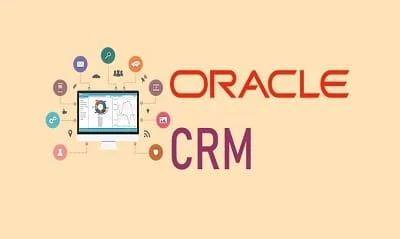Dive into the world of Oracle CRM with this comprehensive guide that unveils its key features, benefits, and industry applications. Get ready to discover how Oracle CRM can revolutionize your business processes.
Overview of Oracle CRM
Oracle Customer Relationship Management (CRM) is a comprehensive solution that helps businesses manage their customer interactions efficiently. It provides a range of tools and features to streamline sales, marketing, and customer service processes.
Key Features of Oracle CRM
- Lead Management: Oracle CRM allows businesses to track and manage leads effectively, ensuring no opportunity is missed.
- Sales Automation: The system automates sales processes, helping sales teams to increase productivity and close deals faster.
- Marketing Automation: Oracle CRM enables targeted marketing campaigns, personalized customer communication, and lead nurturing.
- Customer Service: The platform offers tools for managing customer inquiries, complaints, and support requests, improving overall customer satisfaction.
Benefits of using Oracle CRM
- Improved Efficiency: By automating processes and centralizing customer data, Oracle CRM helps businesses operate more efficiently.
- Enhanced Customer Experience: With better insights into customer needs and preferences, businesses can deliver personalized experiences and build stronger relationships.
- Increased Sales: Oracle CRM enables sales teams to focus on high-value leads, resulting in higher conversion rates and increased revenue.
Industries commonly using Oracle CRM
- Retail: Retail businesses leverage Oracle CRM to manage customer relationships, track sales, and analyze consumer behavior.
- Financial Services: Banks and financial institutions use Oracle CRM to streamline customer interactions, improve service quality, and drive sales growth.
- Telecommunications: Telecom companies utilize Oracle CRM to manage subscriber data, optimize marketing campaigns, and enhance customer service.
Oracle CRM Modules
Oracle CRM offers a range of modules designed to streamline various aspects of customer relationship management. Each module serves a specific purpose and can be customized to meet the unique needs of different businesses.
Sales Automation
- Allows businesses to track sales opportunities, manage leads, and automate the sales process.
- Enables sales teams to forecast sales, monitor performance, and collaborate effectively.
- Example: A sales automation module can help a company track leads, follow up with prospects, and analyze sales performance to optimize strategies.
Marketing Automation
- Helps businesses automate marketing campaigns, track customer interactions, and measure marketing ROI.
- Facilitates lead management, email marketing, and campaign tracking.
- Example: With marketing automation, a company can create targeted campaigns, nurture leads, and analyze campaign effectiveness to improve marketing efforts.
Customer Service
- Enables businesses to manage customer inquiries, complaints, and feedback efficiently.
- Provides tools for case management, knowledge base access, and customer self-service portals.
- Example: Using the customer service module, a company can track and resolve customer issues, provide timely support, and enhance customer satisfaction.
Analytics
- Offers insights into customer behavior, sales performance, and marketing effectiveness.
- Helps businesses make data-driven decisions, identify trends, and optimize strategies.
- Example: By utilizing the analytics module, a business can analyze customer data, track key metrics, and make informed decisions to improve overall performance.
Implementation of Oracle CRM
Implementing Oracle CRM in an organization requires careful planning and execution to ensure a successful deployment. Below are the best practices, challenges, and steps involved in setting up Oracle CRM for optimal performance.
Best Practices for Implementing Oracle CRM
- Define clear objectives and goals for the CRM implementation to align with the organization's overall strategy.
- Allocate sufficient resources, including budget, time, and skilled personnel, to support the implementation process.
- Engage key stakeholders from various departments to gather requirements and ensure buy-in throughout the implementation.
- Customize Oracle CRM to fit the specific needs of the organization while leveraging out-of-the-box features to streamline processes.
- Provide comprehensive training to end-users to ensure adoption and maximize the benefits of Oracle CRM.
Challenges During Implementation and How to Overcome Them
- Resistance to change: Address resistance by communicating the benefits of Oracle CRM and involving employees in the decision-making process.
- Data migration issues: Conduct thorough data cleansing and validation to ensure accurate data transfer to Oracle CRM
.
- Lack of executive sponsorship: Secure support from senior leadership to drive the CRM implementation and overcome organizational hurdles.
- Integration complexities: Work closely with IT teams to integrate Oracle CRM with existing systems and applications for seamless operations.
Steps for Setting Up Oracle CRM for Optimal Performance
- Define the scope and objectives of the CRM implementation project.
- Create a detailed implementation plan with timelines, milestones, and responsibilities.
- Configure Oracle CRM based on the organization's requirements and processes.
- Test the system thoroughly to identify and resolve any issues before going live.
- Train end-users on how to use Oracle CRM effectively and provide ongoing support post-implementation.
Customization and Integration
Customization and integration are crucial aspects when it comes to maximizing the efficiency and effectiveness of Oracle CRM for businesses. Let's explore how Oracle CRM can be tailored to meet specific business needs and successfully integrated with other systems.
Customization of Oracle CRM
Oracle CRM offers a high level of flexibility for customization to align with unique business requirements. Companies can tailor the CRM system to match their specific processes, workflows, and data fields. This customization ensures that the CRM solution seamlessly fits into the organization's operations, enhancing user adoption and overall productivity.
Integration with Other Systems
Successful integration of Oracle CRM with other systems such as ERP (Enterprise Resource Planning) and marketing automation platforms is essential for creating a unified data environment. By integrating CRM with ERP, businesses can ensure smooth data flow between sales, marketing, and finance departments, leading to better decision-making and improved customer interactions.
Similarly, integrating Oracle CRM with marketing automation tools enables companies to streamline their lead generation, nurturing, and conversion processes. This integration ensures that marketing and sales teams have access to real-time data, allowing for more personalized and targeted campaigns.
Importance of Seamless Integration
Seamless integration of Oracle CRM with other systems is crucial for maximizing efficiency and achieving a holistic view of customer interactions. A unified data environment eliminates silos and enables cross-department collaboration, leading to improved customer experiences and increased sales opportunities.
Oracle CRM Analytics
Oracle CRM offers robust analytical capabilities that enable businesses to extract valuable insights from their customer data. By leveraging CRM analytics, organizations can make data-driven decisions to enhance customer relationships, improve marketing strategies, and boost overall business performance.
Analytical Capabilities of Oracle CRM
Oracle CRM provides a comprehensive set of analytical tools to help businesses gain deeper insights into their customer interactions and behaviors. Some key analytical capabilities include:
- Customer Segmentation: Oracle CRM allows businesses to segment their customer base based on various criteria such as demographics, purchase history, and behavior patterns.
- Sales Forecasting: The platform enables accurate sales forecasting by analyzing past sales data, pipeline trends, and market conditions.
- Marketing Campaign Analysis: Oracle CRM helps assess the effectiveness of marketing campaigns by tracking key metrics such as conversion rates, click-through rates, and ROI.
- Customer Lifetime Value: Businesses can calculate the lifetime value of their customers using Oracle CRM, enabling them to focus on high-value customers and tailor their strategies accordingly.
Leveraging CRM Analytics for Data-Driven Decision-Making
By harnessing the power of CRM analytics, businesses can make informed decisions based on real-time data and actionable insights. Some ways organizations can leverage CRM analytics for data-driven decision-making include:
- Identifying Key Trends: Oracle CRM helps businesses identify key trends in customer behavior, market dynamics, and sales performance, allowing them to adapt their strategies accordingly.
- Improving Operational Efficiency: By analyzing customer data and sales processes, organizations can streamline operations, optimize resource allocation, and improve overall efficiency.
- Enhancing Customer Experience: CRM analytics enable businesses to personalize customer interactions, anticipate needs, and deliver exceptional customer experiences based on data-driven insights.
Key Performance Indicators Tracked and Analyzed by Oracle CRM
Oracle CRM can track and analyze a wide range of key performance indicators (KPIs) to measure business performance and customer engagement. Some examples of KPIs that Oracle CRM can monitor include:
| Sales Conversion Rate |
Customer Acquisition Cost |
Customer Retention Rate |
| Lead Response Time |
Customer Satisfaction Score |
Average Deal Size |
Final Review
In conclusion, Oracle CRM stands as a robust solution for businesses looking to streamline operations and enhance customer relationships. With its customizable modules, seamless integration capabilities, and powerful analytics, Oracle CRM is truly a game-changer in the realm of customer relationship management.
FAQ Guide
How can Oracle CRM benefit my business?
Oracle CRM offers improved customer insights, streamlined processes, and enhanced productivity, ultimately leading to better customer relationships and increased revenue.
What industries commonly use Oracle CRM?
Oracle CRM is widely used in industries such as finance, healthcare, retail, and telecommunications for managing customer interactions effectively.
How can Oracle CRM be customized?
Oracle CRM can be tailored to specific business needs through custom fields, workflows, and user permissions to align with unique business requirements.
What are some key performance indicators tracked by Oracle CRM?
Oracle CRM can track KPIs such as customer acquisition cost, customer retention rate, sales conversion rate, and customer lifetime value to measure business performance.






